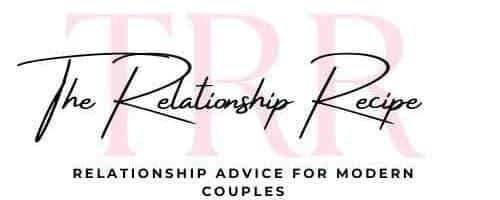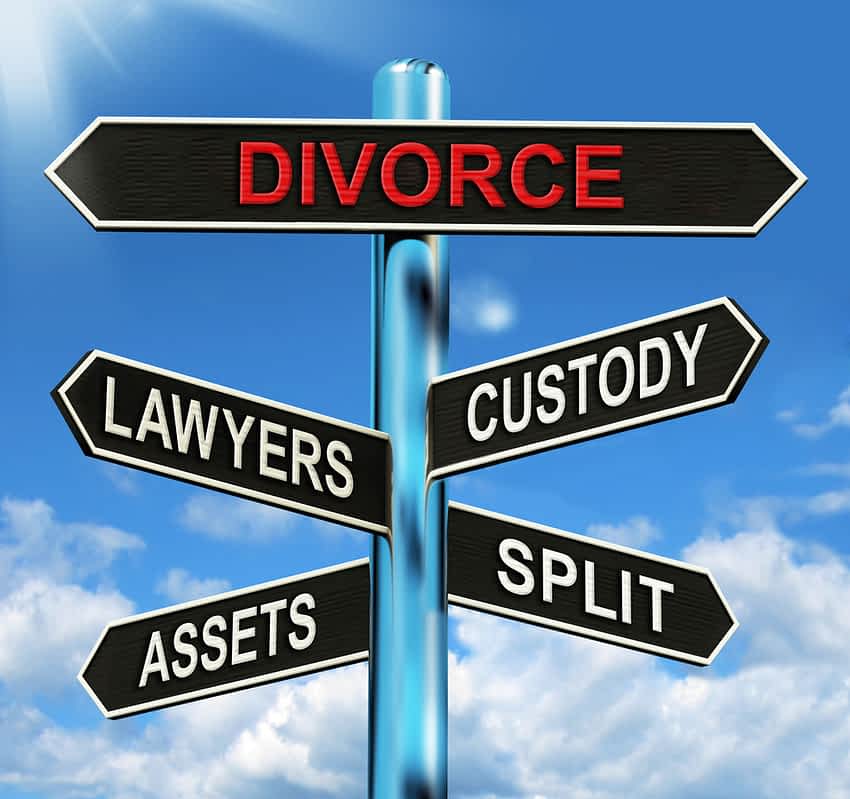Machiavellianism in Relationships: 4 Helpful Ways to Handle It
Ever met someone who always seems a few steps ahead – like they’re playing emotional chess while you’re just trying to have a normal conversation? That’s the kind of vibe I’m talking about when we get into the dark world of machiavellianism in relationships.
The term comes from Niccolò Machiavelli, the guy who wrote The Prince, but these days, psychology has taken his name and run with it, using it to describe one of the three traits in what’s called the Dark Triad (alongside narcissism and psychopathy).
Machiavelli believed that sometimes, to lead effectively, you had to be a little ruthless and manipulative, even if it meant protecting or strengthening your power. It was all about the big picture, even if that meant making some morally gray moves along the way.
Fast forward a few centuries, and psychologists took that same concept and turned it into what we now call machiavellianism. People who lean this way don’t just want to win, they want to win strategically, even if someone else gets hurt in the process.
Machiavellianism is all about manipulation, control, and strategic thinking, often with very little emotional warmth. It’s not just a historical idea, it shows up in real relationships all the time. So today, we’re diving into where this behavior comes from, and why it can be so damaging in close, personal relationships.

🔑 Key Highlights
- Why Machiavellians play the long game (and what they’re really after)
- How calculated charm can wreck emotional safety in relationships
- The surprising traits that make Machiavellians harder to spot than narcissists
- What makes you vulnerable to their tactics without even realizing it
- One piece of advice that might save you a whole lot of heartache

How Machiavellianism in Relationships Shows Up
When I first started digging into this topic, I immediately thought of Adam from Dynasty, the original ‘80s version, not that watered-down remake. He was the long-lost Carrington son who’d stop at nothing to secure his place in the family legacy. It was wild how laser-focused he was on bringing a Carrington baby into the world, like it was his ticket to power.
And if you weren’t a Dynasty person there’s always J.R. Ewing from Dallas, or Abby from Knots Landing. These characters didn’t just want power, they knew exactly how to get it. That kind of calculated behavior is textbook machiavellianism.
So what exactly does machiavellianism in relationships mean when we’re talking about real people, not just villains from an old-school soap? In short, it’s a personality trait rooted in manipulation, strategy, and putting one’s own interests above … pretty much everything (and everyone) else.
Unlike a narcissist, who loudly craves the spotlight, or a psychopath, who might be impulsive or even dangerous, a Machiavellian personality plays the long game. They’re quiet schemers. You won’t always see them coming until you realize you’ve been part of their plan all along.

Traits of Machiavellianism in Relationships (and why it’s so toxic)
When you’re dealing with a machiavellian, it can feel like you’re connecting with a ghost, someone who’s physically present but emotionally slippery. People with strong machiavellian traits often seem charming and confident at first. They know how to work a room, say all the right things, and make themselves seem magnetic. But that charm is often just a mask. Beneath it is someone who’s focused almost entirely on personal ambition, power, and self-interest.
They usually place money and status above emotional connection. Relationships are less about love or loyalty, and more about what they can gain. Warmth and genuine emotional presence is really NOT their thing. They may come across as mysterious or hard to read, but that’s often intentional. Keeping their real motives hidden gives them control.
Machiavellians tend to see morality and principles as flexible – even naive. Their sense of right and wrong depends more on convenience than conscience. If hurting someone emotionally helps them get what they want, they won’t lose sleep over it. That low level of empathy makes it easier for them to manipulate, lie, or flatter someone into doing exactly what they need.
In relationships, this can look like emotional detachment or a refusal to commit. They may avoid vulnerability like the plague and lean toward casual flings instead of anything deep or lasting. Machiavellians are incredibly patient and strategic. They are never impulsive, and are always calculating their next move.
They can read people with scary precision. They know when to play sweet, when to pull back, when to flatter, and when to press you. But even with all that social awareness, they often struggle to identify their own emotions, or connect with yours.
And the most dangerous part is they don’t always see, or care about, the emotional fallout of their actions. For them, the end always justifies the means. That’s why machiavellianism in relationships can be so damaging.
You might not see the emotional toll right away, but over time, the lack of real connection, the manipulation, and the quiet erosion of trust can leave deep wounds.
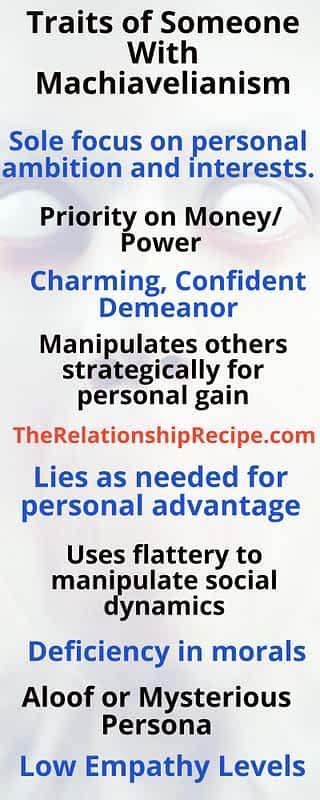
The Impact of Machiavellianism in Relationships
Romantic relationships get incredibly complicated when one partner operates with a machiavellian mindset. What might look like charm and confidence early on often masks a deeper pattern of control, manipulation, and emotional detachment.
This becomes a problem when you don’t think the same way they do, because you are constantly blindsided with the constant 💩 they throw at you.
When you’re on the other side of this dynamic, it’s confusing. At first, you might think you’re dealing with someone who’s just guarded or private. But over time, patterns start to emerge in the form of broken promises, gaslighting, subtle power plays, and a clear emotional wall that keeps true intimacy at arm’s length.
Machiavellianism in relationships is especially damaging because it erodes trust slowly. You may find yoiurself questioning your own judgment, feeling constantly off-balance, or emotionally drained without fully understanding why. That’s because machiavellians often use deceit, guilt, or calculated affection as tools to maintain control – not because they’re emotionally invested, but because they’re trying to gain something: status, money, admiration, or even just the satisfaction of “winning.”
Here’s the hardest part: machiavellianism is marked by a lack of genuine empathy. That means when you’re hurting, your pain often gets minimized, ignored, or used against you when you are already hurting. Vulnerability doesn’t deepen the connection; it gives them more material to work with.
Emotional intimacy suffers. You might feel like you’re in a relationship with someone who’s never truly with you. The connection feels toxic, one-sided, conditional, and unsafe. Healthy love requires openness, trust, and mutual care – three things that machiavellian dynamics slowly dismantle.
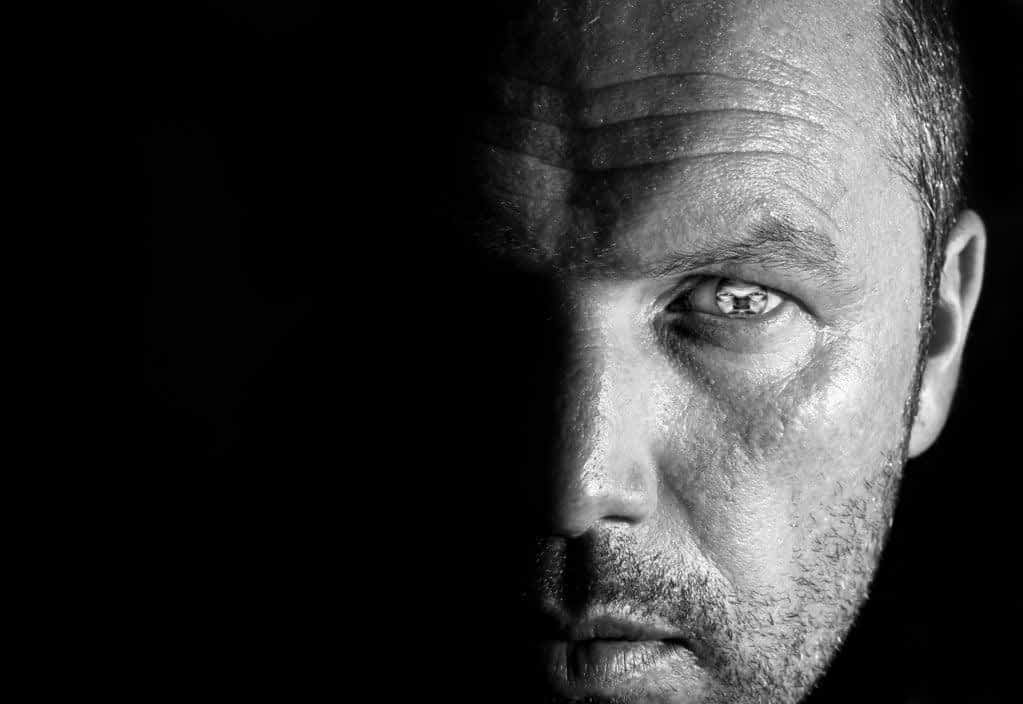
Handling Machiavellianism in Relationships
My first piece of advice when it comes to dealing with machiavellianism in relationships is … Run. Like, full-on, Forrest Gump-style run. Don’t look back.
I know not everyone can just walk away that easily. Maybe you’re tangled up emotionally, financially, or even legally with a machiavellian. So if you can’t immediately cut ties, you’ve got to be smart about protecting yourself.
Dealing with machiavellians means understanding exactly what you’re up against. These folks are masters of the long con. They manipulate, scheme, and play on your emotions to get what they want, usually without a second thought about how it affects you. Trying to handle them like you would a regular partner, with empathy, open communication, and vulnerability, simply won’t work. In fact, they’ll likely use all of that against you.
Step one: is to set boundaries like your sanity depends on it. Because it does. Be clear. Be firm. Don’t leave wiggle room, and don’t second-guess yourself when they try to twist your words or guilt-trip you.
Step two: Protect your energy. Emotional manipulation is their favorite sport. Don’t give them front-row access to your inner world. Keep personal info close to your chest, especially if they’ve used it against you before.
Step three: Document everything. If this relationship involves money, kids, shared living, or anything that could turn into a legal nightmare, start a paper trail. Machiavellians are experts at rewriting history and making you look like the villain, so cover yourself.
Step four: Get support. Seriously. Don’t go through this alone. Talk to a therapist, reach out to a trusted friend, or join a support group. Being in a relationship with someone who operates this way can wear you down emotionally, and you’ll need solid people in your corner who remind you what real love and respect feel like.
Handling machiavellianism in relationships is about protecting yourself, not changing them. Machiavellians rarely reflect on their behavior or feel remorse in the way healthy partners do. Your job isn’t to fix them. It’s to save yourself.

FAQ: Machiavellianism in Relationships
1. What is Machiavellianism in relationships?
It’s when someone uses manipulation, deceit, and emotional games to control their partner, often hiding their true motives to get what they want.
2. How do I know if I’m dating a Machiavellian?
They’ll lie, gaslight, charm, and emotionally distance themselves—all while making you feel like you’re the problem. Red flags will stack up fast.
3. Can Machiavellians love someone genuinely?
Love to a Machiavellian often looks like control. They may say the right things, but deep emotional connection isn’t their strong suit.
4. Are Machiavellians the same as narcissists?
Not quite. Narcissists crave admiration, while Machiavellians crave control. Both are manipulative, but machiavellianism is more cold, calculated, and strategic.
5. Is Machiavellianism considered a personality disorder?
It’s not a clinical disorder on its own, but machiavellianism is part of the Dark Triad, alongside narcissism and psychopathy.
6. Can Machiavellianism in relationships ever be healthy?
Nope. A relationship built on manipulation, secrecy, and self-interest won’t ever be truly healthy or emotionally safe.
7. Why do Machiavellians avoid commitment?
Because deep down, commitment means vulnerability—and machiavellians don’t like giving up control or being emotionally exposed.
8. Can Machiavellians change?
Only if they truly want to—and most don’t. Machiavellianism is a deeply rooted pattern that’s hard to unlearn.
9. What’s the best way to deal with a Machiavellian partner?
Protect your boundaries, get support, and if you can—leave. You won’t win at their game.
10. Is Machiavellianism always obvious at first?
Not at all. Machiavellians are often charming and strategic. You’ll only start seeing the mask slip after some emotional damage is done.
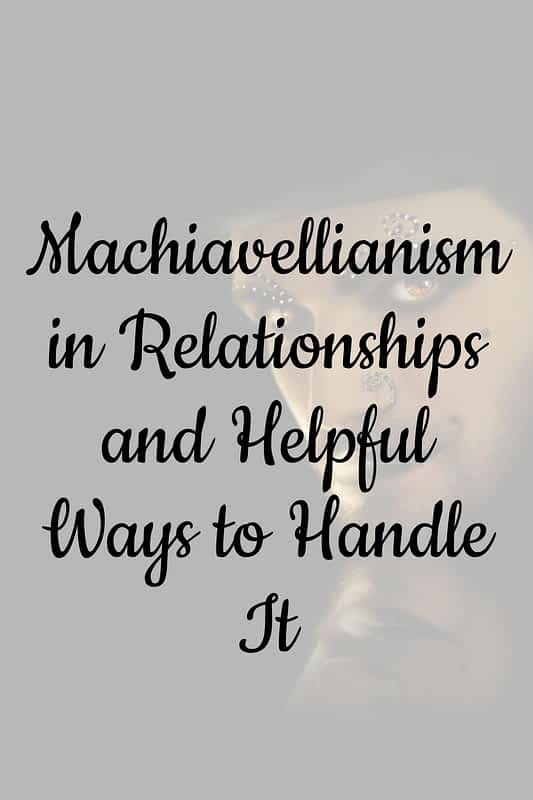
This post may contain affiliate links. I earn from qualifying Amazon purchases at no extra cost to you. This content is for informational purposes only and is not a substitute for professional advice. Read full disclaimer.
Thank you for reading this post, don't forget to subscribe!
